The Dictatorship
There’s a reason the world can’t seem to look away from the breathtaking Louvre heist
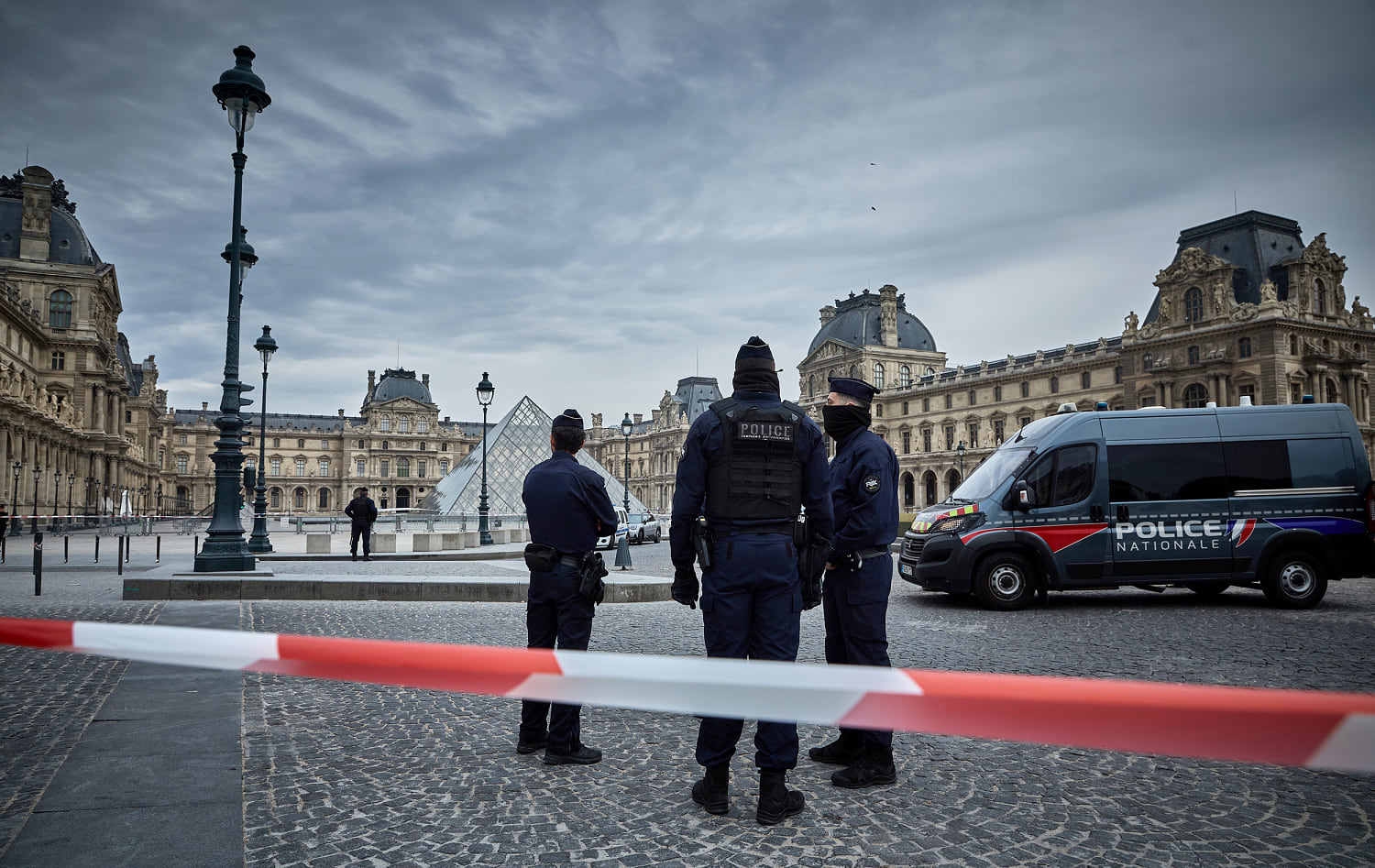
I recently rewatched — for the thousandth time — the 2001 film “Ocean’s Eleven.” Oscar-winning director Steven Soderbergh’s stylish crime thriller, with a cast of superstars including George Clooney, Brad Pitt and Matt Damon, revolves around a team of smooth-talking, charismatic rogues who knock over three casinos in one night. It has long been one of my comfort movies, because I love stories where rascals do a good job. But this particular viewing was also perfectly timed, because a real-life “Ocean’s Eleven” played out in France.
I’ve had heists on my mind since the brazen smash-and-grab of more than $100 million in jewels from the Louvre in Paris. This past Sunday, around 9:30 a.m., a team of thieves entered the museum by breaking through a second-floor window, busted open three displays and, within four minutes, spirited away with Napoleonic-era treasures.
We live in a golden age of high-profile (though not always successful) plunder.
It was a breathtaking crime at what was thought to be an impregnable home of some of the world’s most famous artworks, including the “Mona Lisa” and the Venus de Milo. But the thieves instead targeted jewelry that once belonged to the French royal family and that, according to some experts, could be melted down for easier sale on the black market. An investigation is underway, and the thieves are now the most notorious criminals in Europe.
We live in a golden age of high-profile (though not always successful) plunder. This heist comes on the heels of a lesser-known crime in Paris last month, when a woman allegedly stole 13 pounds of gold nuggets from the National Museum of Natural History. She was arrested two weeks later in Barcelona, Spain.
In 2022, seven thieves knocked over a Brinks truck in California, in what was called the largest jewel heist in U.S. history; the loot totaled $100 million. In 2019, five men stole a cache of precious 18th century jewels worth $113 million from Germany’s Green Vault museum.
The Louvre heist was a crime that will negatively affect the lives of otherwise innocent people. Museum officials have admitted to security lapses, including insufficient closed-circuit television coverage outside the Louvre’s perimeter. The blame game is just beginning.
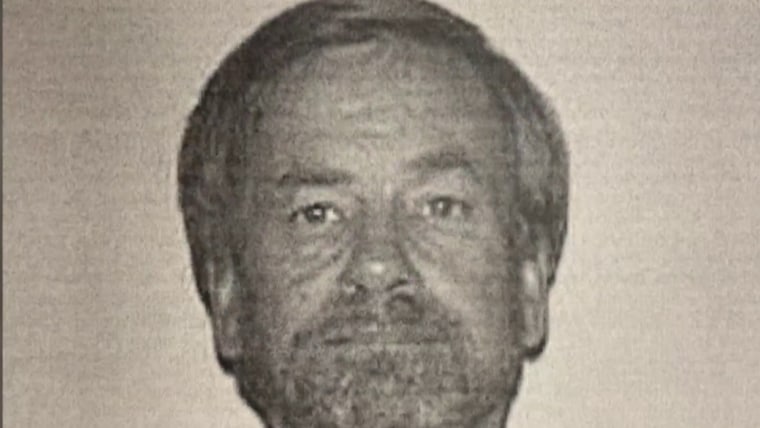
But it’s hard to read about this daring plot and not, in a small way, root for these villains. There are far grislier and more destructive crimes committed every day, big and small. This might sound like a rationalization, but petty crooks routinely mug regular folks while wealthy pedophiles escape justice. The thieves who robbed the Louvre, on the other hand, just ripped off the French government.
The sense of rooting for the robbers plays a part in Hollywood’s and audiences’ enduring love for heist movies. One of the genre’s most influential films is Jules Dassin’s 1955 French noir “Rififi,” about a jewel heist led by a debonair master criminal. The black-and-white classic is anchored by its iconic 30-minute break-in — a silent nail-biter as the crew painstakingly muffles the sound of their drilling.
Heist movies are Robin Hood fantasies where hypercompetent thieves take on powerful institutions.
In the decades since, many of Hollywood’s biggest directors have put fresh spins on the genre, including Spike Lee’s lively bank-heist-turned-standoff thriller “Inside Man” (2006), Edgar Wright’s “Baby Driver” (2017) and Christopher Nolan’s “Inception” (2010), about a heist team that infiltrates dreams. Even “Avengers: Endgame” (2019), the second-highest-grossing movie of all time and the climax of more than a decade of Marvel movies, hinges on a time-travel heist.
Crime doesn’t always pay in these movies: My second-favorite heist film is Michael Mann’s “Heat” (1995), about a seasoned team of seasoned thieves led by a smoldering, goateed Robert De Niro, who are constantly having to look over their shoulders for a Los Angeles police detective, played by Al Pacino. Despite knowing the police are on their tail, the robbers can’t give up the action, and in the end, most of them pay the ultimate price. But we root for these doomed men nonetheless.
Heist movies are Robin Hood fantasies where hypercompetent thieves take on powerful institutions that loom over our moral lives. They cut across cultural and political lines because everyone’s been screwed over by a bank, or an insurance company, or, if you’re a formerly colonized country, a Western empire.
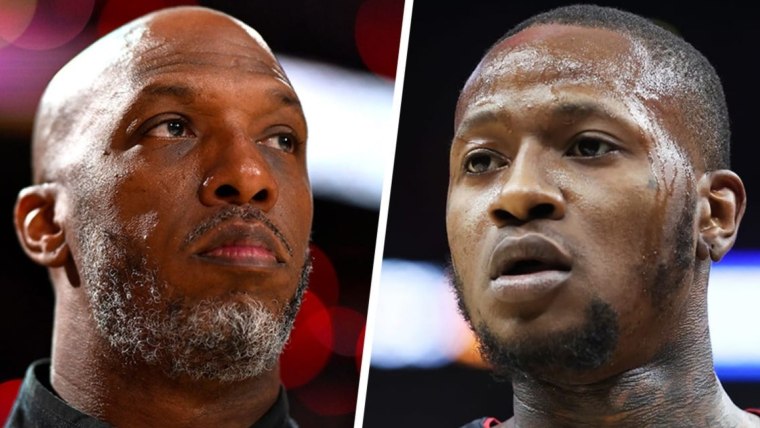
Like their thematic siblings, the prison break flicks — one’s about breaking in, the other’s about breaking out — heist films are tales of the little guy versus the system. The main characters are frequently skilled criminals who adhere to a moral code. They’re committing crimes, but for the most part, they’re “victimless” —banks, casinos and museums are insured and loaded with cash, right?
But the most important part of the fantasy is asking yourself: What if you could get away with it? I am no master criminal. I don’t even like to jaywalk. But I’d make an excellent member of a heist crew. For instance, I have dainty fingers that would be perfect for safe-cracking. I’d certainly enjoy the planning stages: I’m a fan of maps and spreadsheets. But heist movies are simply safe spaces for me to make believe I can wear a tuxedo like George Clooney.
Now that I think about it, I may have to watch “Ocean’s Eleven” again.
John DeVore is a culture writer and author of “Theatre Kids: A True Tale of Off-Off Broadway.”His writing has been published in Esquire, Vanity Fair, Marvel Comics, and many other publications.
The Dictatorship
President says he’s owed ‘lot of money’ over federal probes. Here’s how govt could pay him…
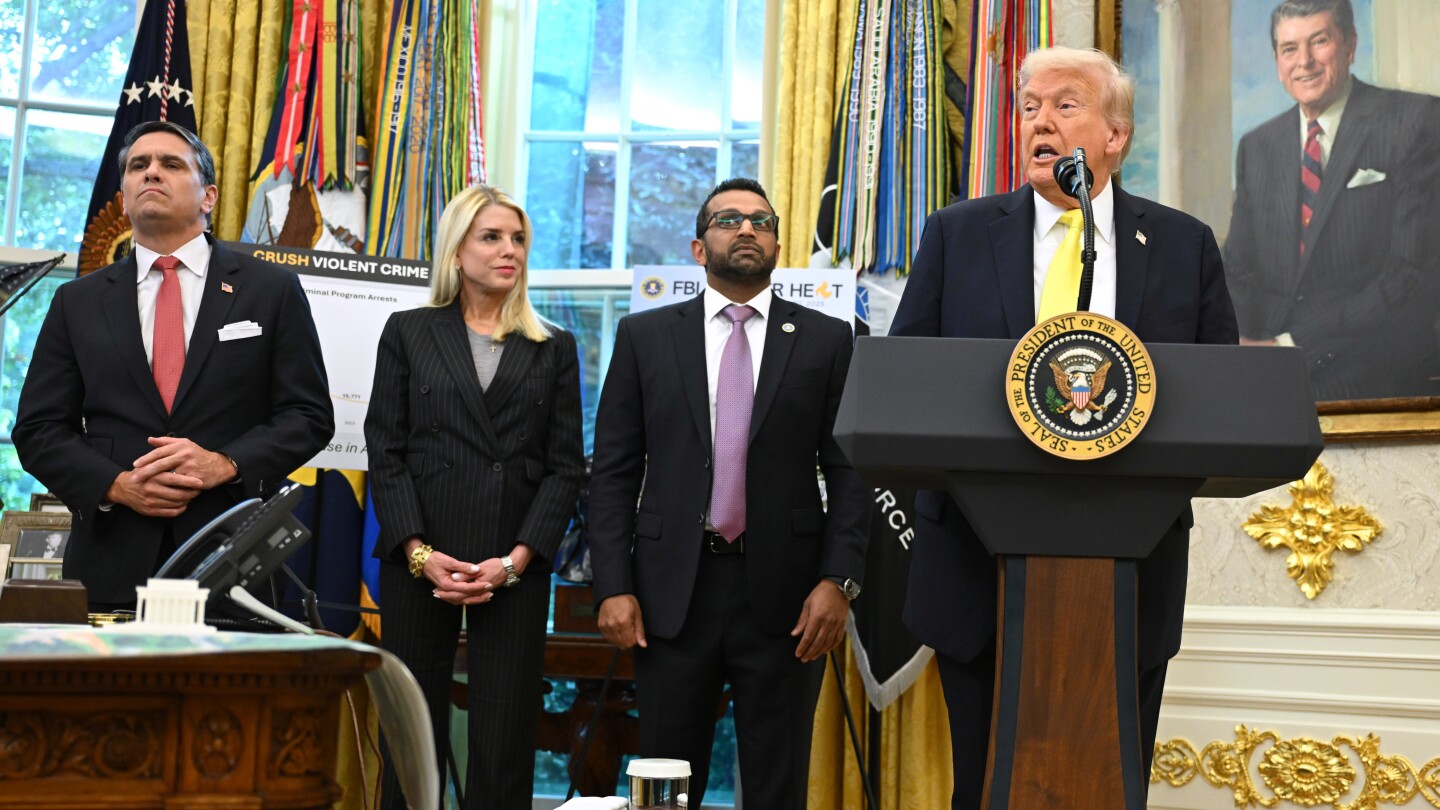
WASHINGTON (AP) — President Donald Trump has suggested he’s entitled to compensation from the federal government over investigations he faced that he claims were politically motivated. Now, the Justice Department that Trump has exerted control over could approve a hefty payout in taxpayer dollars.
The Republican president’s comments in the Oval Office on Tuesday have put a spotlight on a law through which people can seek damages if they believe they were wronged by the federal government.
But the potential that the president might take taxpayer money from the same government he leads has raised numerous ethical questions, especially since Trump has made cutting federal spending a top administration priority.
Adding to conflict-of-interest concerns is the fact that top Justice Department officials who would presumably have to sign off on such a settlement previously served as a defense lawyer for the president or his close allies.
Here’s a look at Trump’s claims and the process that could play out:
How the claims process works
Before reclaiming the White House, Trump filed two claims with the Justice Department seeking $230 million in damages related to the FBI’s 2022 search of his Mar-a-Lago property for classified documents and for a separate investigation into potential ties between Russia and his 2016 presidential campaign, The New York Times reported Tuesday.
He filed the claims in 2023 and 2024 under a law that permits individuals to sue federal agencies, like the Justice Department, if they believe they’ve been harmed by employees of those agencies acting within the scope of their duties. Under the Federal Tort Claims Act, individuals must first file an administrative claim with the government agency. The agency then has six months to either settle the claim or deny it outright.
If the agency denies the claim or doesn’t act on it within that time frame, the person can then file a federal lawsuit. Trump has not yet filed a lawsuit on either claim, even though six months have passed.
The usual source of payments for claims against the government is from what’s known as the Judgment Fund. Treasury Department records show payments from the Judgment Fund over the last year on behalf of a slew of federal agencies related to discrimination claims, violations of the Privacy Act and other matters.
In one recent high-profile case, the Justice Department in 2024 agreed to pay more than $138 million to settle 139 administrative claims brought by people who accused the FBI of grossly mishandling allegations of sexual assault against Larry Nassar in 2015 and 2016.
Why Trump says the government owes him money
Trump has long claimed he was the victim of a weaponized Justice Department that targeted him for political purposes. The Biden administration’s Justice Department abandoned both criminal cases it brought against Trump after his White House victory last November because of department policy against prosecuting a sitting president.
The president signaled his interest in compensation during a White House appearance last week with Deputy Attorney General Todd Blanche, FBI Director Kash Patel and Attorney General Pam Bondi — telling reporters “I’m suing myself” — even though his claims to date have not been filed as lawsuits. He said he believes the government owes him a “lot of money,” but suggested he could donate any taxpayer money or use it to help pay for a ballroom he’s building at the White House.
One of the administrative claims, filed in August 2024 and reviewed by The Associated Press, seeks $115 million in compensatory and punitive damages over the search of his Mar-a-Lago estate and the resulting case alleging he hoarded classified documents and thwarted government efforts to retrieve them.
It accuses former Attorney General Merrick Garland, former FBI Director Christopher Wray and Justice Department special counsel Jack Smith of harassing and targeting Trump with a “malicious prosecution” in an effort to hurt Trump’s bid to reclaim the White House.
The Times said the other claim seeks damages related to the long-concluded Trump-Russia investigation, which continues to infuriate the president.
Defense lawyers for Trump and his allies could have the final say
Trump’s claims have raised thorny ethical issues because under Justice Department policy, proposed settlements of more than $4 million must be approved by the deputy attorney general or associate attorney general. Blanche, the deputy attorney general, was one of Trump’s lead defense lawyers in the Mar-a-Lago investigation. And Associate Attorney General Stanley Woodward represented Trump’s valet and co-defendant, Walt Nauta, in the same case.
The department has not said whether Blanche and Woodward would be recused in settlement talks, but said in a statement on Tuesday that “in any circumstance, all officials at the Department of Justice follow the guidance of career ethics officials.” Bondi, in July, however, fired the department’s top official responsible for advising the attorney general and deputy attorney general on ethics issues.
Democrats plan to investigate
Democrats pounced on the news, announcing that Rep. Jamie Raskin of Maryland, the top Democrat on the House Judiciary Committee, would launch an investigation into what they called a “shakedown” that violated the Constitution.
It was not immediately clear what shape that inquiry might take, but it seems unlikely that Raskin or other Democrats will get any cooperation from Justice Department leadership, particularly in the aftermath of a combative congressional appearance that Bondi made earlier this month.
The Dictatorship
BREAKING: Prosecutors recently told DOJ there is not enough evidence to prosecute Sen. Adam Schiff


-
Now Playing

-
UP NEXT
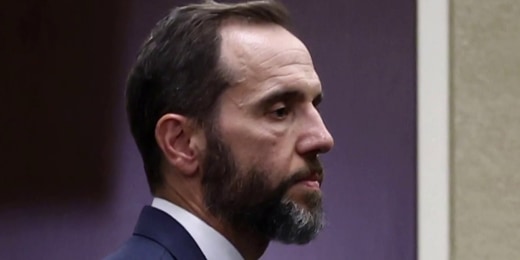
‘Game on’: Jack Smith offers to testify in public hearing over his investigation into Donald Trump
10:53
-
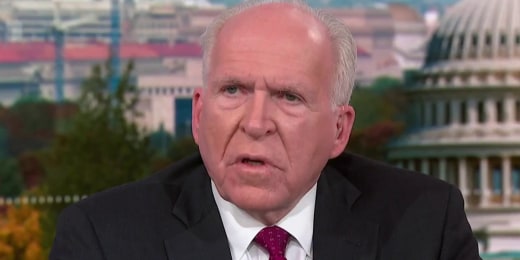
John Brennan speaks out after Republicans in Congress refer him for criminal prosecution
10:00
-
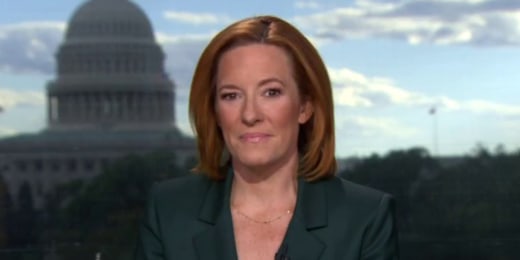
‘A little fragile boy who needs to have big toys’: Jen Psaki on Trump’s White House demolition
06:59
-

Mike Johnson sued for delaying congressional swearing amid lingering Epstein Files vote
10:13
-
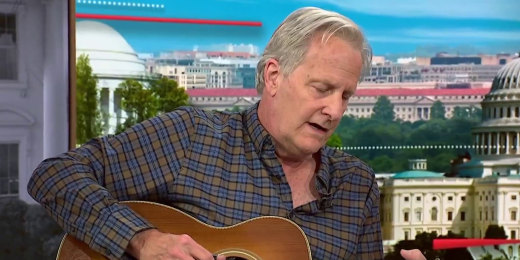
Jeff Daniels gives live performance inspired by No Kings Protest of the Trump Administration
03:41
-
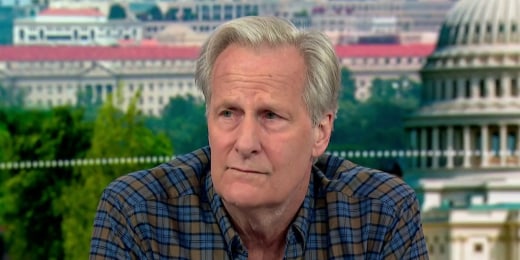
‘Nixon, Reagan…either Bush wouldn’t have done that’: Jeff Daniels on Trump’s response to No Kings
08:35
-

‘The stupidity is unbelievable here’: Nicolle Wallace on Lindsey Halligan texting grand jury info
10:47
-

‘The victim is the American people’: Trump set to force his own government to pay him $230 million
06:39
-
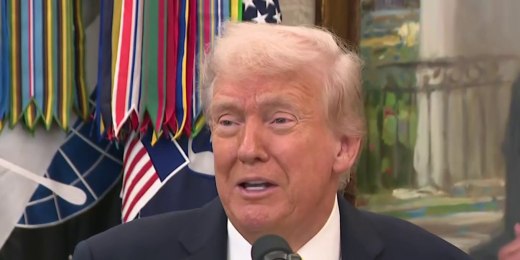
‘He might as well rob Fort Knox and take the gold out’: Reaction to Trump shaking down his own DOJ
11:51
-
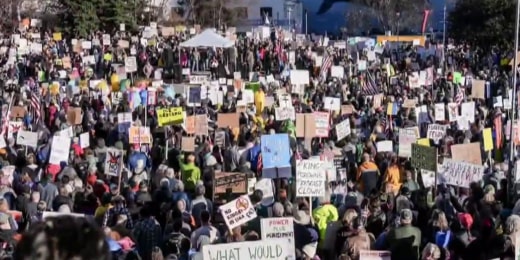
‘Got under his skin’: Trump lashes out after nearly 7 million turn out for No Kings protest
08:28
-

Nicolle Wallace reacts to Donald Trump’s vile social media post over No Kings protest
08:11
-

‘They are not kids’: Nicolle Wallace reacts to JD Vance defending racist ‘young’ Republicans chat
06:33
-
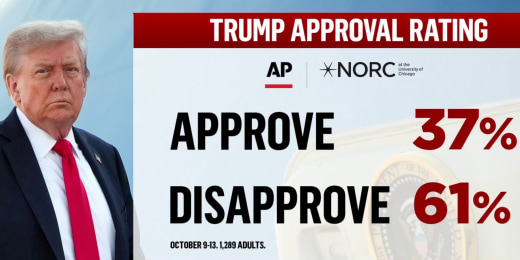
Poll: Donald Trump approval rating hits new low for second term
06:47
-

‘If only he shared documents in a Mar-A-Lago bathroom’: Nicolle Wallace on John Bolton’s indictment
11:34
-

BREAKING: John Bolton indicted by federal grand jury
09:12
-

Maddow and Nicolle Wallace react as reporters walk out of Pentagon amid Hegseth’s press crackdown
05:37
-
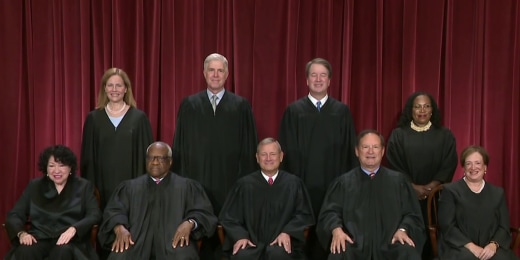
Supreme Court hears case that could obliterate the Voting Rights Act
12:10
-

DHS propaganda videos distorting reality in Chicago, while ICE terrorizes communities
06:25
-
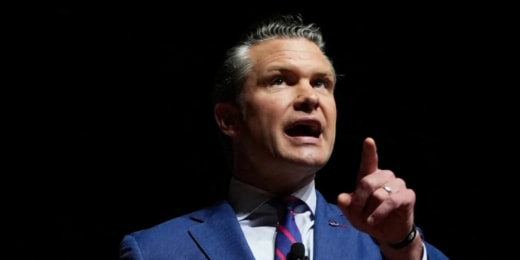
‘Out of his league’: Pete Hegseth’s new press policy puts his paranoia of full display
10:35
-
Now Playing

BREAKING: Prosecutors recently told DOJ there is not enough evidence to prosecute Sen. Adam Schiff
05:56
-
UP NEXT

‘Game on’: Jack Smith offers to testify in public hearing over his investigation into Donald Trump
10:53
-

John Brennan speaks out after Republicans in Congress refer him for criminal prosecution
10:00
-

‘A little fragile boy who needs to have big toys’: Jen Psaki on Trump’s White House demolition
06:59
-

Mike Johnson sued for delaying congressional swearing amid lingering Epstein Files vote
10:13
-

Jeff Daniels gives live performance inspired by No Kings Protest of the Trump Administration
03:41
The Dictatorship
D.C. man sues after arrest for playing ‘Star Wars’ music to protest National Guard troops

A Washington, D.C.resident who drew attention to the deployment of the National Guard in the district by playing “The Imperial March” from “Star Wars” is now suing after he was detained in what he argues was a violation of his rights while protesting.
“The law might have tolerated government conduct of this sort a long time ago in a galaxy far, far away,” Sam O’Hara’s lawyers with the American Civil Liberties Union wrote in a civil complaint filed Thursdayplaying on the “Star Wars” theme. “But in the here and now, the First Amendment bars government officials from shutting down peaceful protests, and the Fourth Amendment (along with the District’s prohibition on false arrest) bars groundless seizures,” they wrote.
The complaint, filed in federal district court in Washington, D.C., gave O’Hara’s account of his detention last month. It followed one of the times he recorded and protested the deployment by playing the theme associated with “Star Wars” villain Darth Vader, while walking behind Guard members on public streets.
The incident leading to the lawsuit arose when the 35-year-old was coming home from work on Sept. 11, and he began walking behind a group of Guard members while playing the march on his phone and recording them. He said he didn’t speak to them, touch them or interfere with their activities, and he said he played the music loudly but not at a “blaring level.”
O’Hara’s complaint said that most Guard members he encountered during his protests ignored him and that “a few smiled or laughed.” But he said that on Sept. 11, Sgt. Devon Beck of the Ohio National Guard “was not amused by this satire,” and that Beck contacted D.C. police officers, who handcuffed the plaintiff and blocked him from “continuing his peaceful protest.” He was released without charge.
O’Hara’s suit names Beck, several D.C. officers and the District of Columbia as civil defendants. He claims violations of the First and Fourth Amendments, as well as false arrest and battery. He said officers refused to loosen his tight handcuffs, which caused him pain. The defendants will have an opportunity to respond in court before a judge weighs in on how the case will proceed.
The suit comes as litigation unfolds over the Trump administration’s attempted deployments in Los Angeles; Portland, Oregon; and Chicago, with the last pending before the Supreme Court in a case that could be decided any moment.
Subscribe to the Deadline: Legal Newsletter for expert analysis on the top legal stories of the week, including updates from the Supreme Court and developments in the Trump administration’s legal cases.
Jordan Rubin is the Deadline: Legal Blog writer. He was a prosecutor for the New York County District Attorney’s Office in Manhattan and is the author of “Bizarro,” a book about the secret war on synthetic drugs. Before he joined BLN, he was a legal reporter for Bloomberg Law.
-
Uncategorized12 months ago
Bob Good to step down as Freedom Caucus chair this week
-

 Politics8 months ago
Politics8 months agoFormer ‘Squad’ members launching ‘Bowman and Bush’ YouTube show
-

 The Josh Fourrier Show12 months ago
The Josh Fourrier Show12 months agoDOOMSDAY: Trump won, now what?
-

 The Dictatorship8 months ago
The Dictatorship8 months agoPete Hegseth’s tenure at the Pentagon goes from bad to worse
-

 Politics8 months ago
Politics8 months agoBlue Light News’s Editorial Director Ryan Hutchins speaks at Blue Light News’s 2025 Governors Summit
-

 The Dictatorship8 months ago
The Dictatorship8 months agoLuigi Mangione acknowledges public support in first official statement since arrest
-

 Politics12 months ago
Politics12 months agoWhat 7 political experts will be watching at Tuesday’s debate
-

 Politics8 months ago
Politics8 months agoFormer Kentucky AG Daniel Cameron launches Senate bid






